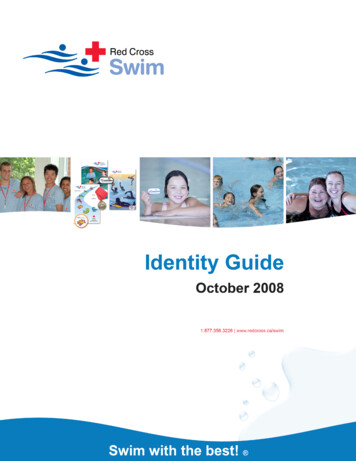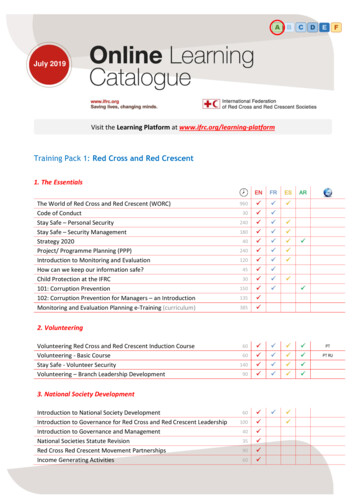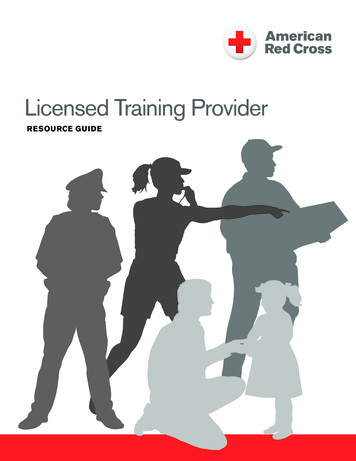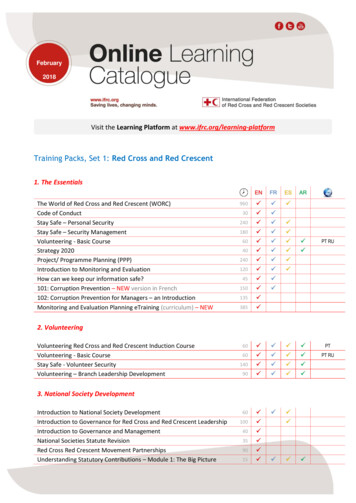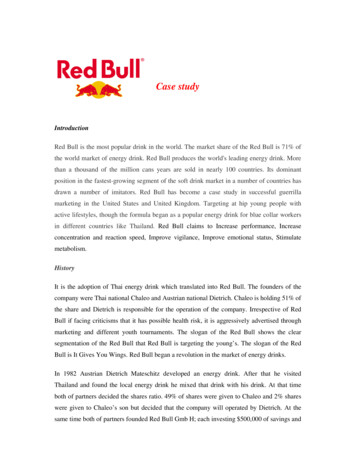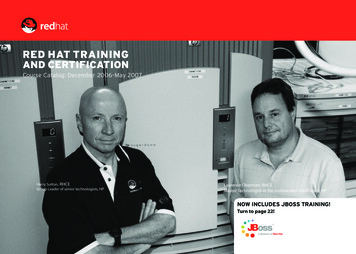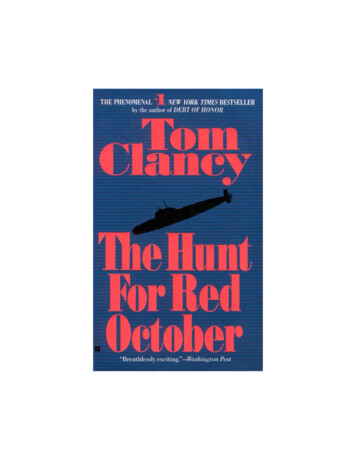
Transcription
Tom ClancyThe HuntFor RedOctober
AcknowledgementsFor technical information and advice I am especially indebted to Michael Shelton, former navalaviator; Larry Bond, whose naval wargame, “Harpoon,” was adopted for the training of NROTCcadets; Drs. Gerry Sterner and Craig Jeschke; and Lieutenant Commander Gregory Young, USN.
For Ralph Chatham,A sub driver who spoke the truth,And for all the men who wear dolphins
THE FIRST DAYFRIDAY, 3 DECEMBERThe Red OctoberCaptain First Rank Marko Ramius of the Soviet Navy was dressed for the Arctic conditionsnormal to the Northern Fleet submarine base at Polyarnyy. Five layers of wool and oilskinenclosed him. A dirty harbor tug pushed his submarine's bow around to the north, facing downthe channel. The dock that had held his Red October for two interminable months was now awater-filled concrete box, one of the many specially built to shelter strategic missile submarinesfrom the harsh elements. On its edge a collection of sailors and dockyard workers watched hisship sail in stolid Russian fashion, without a wave or a cheer."Engines ahead slow, Kamarov," he ordered. The tug slid out of the way, and Ramiusglanced aft to see the water stirring from the force of the twin bronze propellers. The tug'scommander waved. Ramius returned the gesture. The tug had done a simple job, but done itquickly and well. The Red October, a Typhoon-class sub, moved under her own power towardsthe main ship channel of the Kola Fjord."There's Purga, Captain." Gregoriy Kamarov pointed to the icebreaker that would escortthem to sea. Ramius nodded. The two hours required to transit the channel would tax not hisseamanship but his endurance. There was a cold north wind blowing, the only sort of north windin this part of the world. Late autumn had been surprisingly mild, and scarcely any snow hadfallen in an area that measures it in meters; then a week before a major winter storm had savagedthe Murmansk coast, breaking pieces off the Arctic icepack. The icebreaker was no formality.The Purga would butt aside any ice that might have drifted overnight into the channel. It wouldnot do at all for the Soviet Navy's newest missile submarine to be damaged by an errant chunk offrozen water.The water in the fjord was choppy, driven by the brisk wind. It began to lap over theOctober's spherical bow, rolling back down the flat missile deck which lay before the toweringblack sail. The water was coated with the bilge oil of numberless ships, filth that would notevaporate in the low temperatures and that left a black ring on the rocky walls of the fjord asthough from the bath of a slovenly giant. An altogether apt simile, Ramius thought. The Sovietgiant cared little for the dirt it left on the face of the earth, he grumbled to himself. He hadlearned his seamanship as a boy on inshore fishing boats, and knew what it was to be in harmonywith nature.
"Increase speed to one-third," he said. Kamarov repeated his captain's order over the bridgetelephone. The water stirred more as the October moved astern of the Purga. CaptainLieutenant Kamarov was the ship's navigator, his last duty station having been harbor pilot forthe large combatant vessels based on both sides of the wide inlet. The two officers kept aweather eye on the armed icebreaker three hundred meters ahead. The Purga's after deck had ahandful of crewmen stomping about in the cold, one wearing the white apron of a ship's cook.They wanted to witness the Red October's first operational cruise, and besides, sailors will doalmost anything to break the monotony of their duties.Ordinarily it would have irritated Ramius to have his ship escorted out—the channel here waswide and deep—but not today. The ice was something to worry about. And so, for Ramius, wasa great deal else."So, my Captain, again we go to sea to serve and protect the Rodina!" Captain Second RankIvan Yurievich Putin poked his head through the hatch—without permission, as usual—andclambered up the ladder with the awkwardness of a landsman. The tiny control station wasalready crowded enough with the captain, the navigator, and a mute lookout. Putin was theship's zampolit (political officer). Everything he did was to serve the Rodina (Motherland), aword that had mystical connotations to a Russian and, along with V. I. Lenin, was theCommunist party's substitute for a godhead."Indeed, Ivan," Ramius replied with more good cheer than he felt. "Two weeks at sea. It isgood to leave the dock. A seaman belongs at sea, not tied alongside, overrun with bureaucratsand workmen with dirty boots. And we will be warm.""You find this cold?" Putin asked incredulously.For the hundredth time Ramius told himself that Putin was the perfect political officer. Hisvoice was always too loud, his humor too affected. He never allowed a person to forget what hewas. The perfect political officer, Putin was an easy man to fear."I have been in submarines too long, my friend. I grow accustomed to moderate temperaturesand a stable deck under my feet." Putin did not notice the veiled insult. He'd been assigned tosubmarines after his first tour on destroyers had been cut short by chronic seasickness—andperhaps because he did not resent the close confinement aboard submarines, something thatmany men cannot tolerate."Ah, Marko Aleksandrovich, in Gorkiy on a day like this, flowers bloom!""And what sort of flowers might those be, Comrade Political Officer?" Ramius surveyed thefjord through his binoculars. At noon the sun was barely over the southeast horizon, castingorange light and purple shadows along the rocky walls."Why, snow flowers, of course," Putin said, laughing loudly. "On a day like this the faces ofthe children and the women glow pink, your breath trails behind you like a cloud, and the vodkatastes especially fine. Ah, to be in Gorkiy on a day like this!"The bastard ought to work for Intourist, Ramius told himself, except that Gorkiy is a cityclosed to foreigners. He had been there twice. It had struck him as a typical Soviet city, full oframshackle buildings, dirty streets, and ill-clad citizens. As it was in most Russian cities, winterwas Gorkiy's best season. The snow hid all the dirt. Ramius, half Lithuanian, had childhoodmemories of a better place, a coastal village whose Hanseatic origin had left rows of presentablebuildings.It was unusual for anyone other than a Great Russian to be aboard—much less command—aSoviet naval vessel. Marko's father, Aleksandr Ramius, had been a hero of the Party, adedicated, believing Communist who had served Stalin faithfully and well. When the Soviets
first occupied Lithuania in 1940, the elder Ramius was instrumental in rounding up politicaldissidents, shop owners, priests, and anyone else who might have been troublesome to the newregime. All were shipped off to fates that now even Moscow could only guess at. When theGermans invaded a year later, Aleksandr fought heroically as a political commissar, and waslater to distinguish himself in the Battle of Leningrad. In 1944 he returned to his native landwith the spearhead of the Eleventh Guards Army to wreak bloody vengeance on those who hadcollaborated with the Germans or been suspected of such. Marko's father had been a true Soviethero—and Marko was deeply ashamed to be his son. His mother's health had been brokenduring the endless siege of Leningrad. She died giving birth to him, and he was raised by hispaternal grandmother in Lithuania while his father strutted through the Party Central Committeein Vilnius, awaiting his promotion to Moscow. He got that, too, and was a candidate member ofthe Politburo when his life was cut short by a heart attack.Marko's shame was not total. His father's prominence had made his current goal a possibility,and Marko planned to wreak his own vengeance on the Soviet Union, enough, perhaps, to satisfythe thousands of his countrymen who had died before he was even born."Where we are going, Ivan Yurievich, it will be colder still."Putin clapped his captain's shoulder. Was his affection feigned or real? Marko wondered.Probably real. Ramius was an honest man, and he recognized that this short, loud oaf did havesome human feelings."Why is it, Comrade Captain, that you always seem glad to leave the Rodina and go to sea?"Ramius smiled behind his binoculars. "A seaman has one country, Ivan Yurievich, but twowives. You never understand that. Now I go to my other wife, the cold, heartless one that ownsmy soul." Ramius paused. The smile vanished. "My only wife, now."Putin was quiet for once, Marko noted. The political officer had been there, had cried realtears as the coffin of polished pine rolled into the cremation chamber. For Putin the death ofNatalia Bogdanova Ramius had been a cause of grief, but beyond that the act of an uncaring Godwhose existence he regularly denied. For Ramius it had been a crime committed not by God butthe State. An unnecessary, monstrous crime, one that demanded punishment."Ice." The lookout pointed."Loose-pack ice, starboard side of the channel, or perhaps something calved off the east-sideglacier. We'll pass well clear," Kamarov said."Captain!" The bridge speaker had a metallic voice. "Message from fleet headquarters.""Read it.""'Exercise area clear. No enemy vessels in vicinity. Proceed as per orders. Signed, Korov,Fleet Commander.'""Acknowledged," Ramius said. The speaker clicked off. "So, no Amerikantsi about?""You doubt the fleet commander?" Putin inquired."I hope he is correct," Ramius replied, more sincerely than his political officer wouldappreciate. "But you remember our briefings."Putin shifted on his feet. Perhaps he was feeling the cold."Those American 688-class submarines, Ivan, the Los Angeleses. Remember what one oftheir officers told our spy? That they could sneak up on a whale and bugger it before it knewthey were there? I wonder how the KGB got that bit of information. A beautiful Soviet agent,trained in the ways of the decadent West, too skinny, the way the imperialists like their women,blond hair . . ." The captain grunted amusement. "Probably the American officer was a boastfulboy, trying to find a way to do something similar to our agent, no? And feeling his liquor, like
most sailors. Still. The American Los Angeles class, and the new British Trafalgars, those wemust guard against. They are a threat to us.""The Americans are good technicians, Comrade Captain," Putin said, "but they are not giants.Their technology is not so awesome. Nasha lutcha," he concluded. Ours is better.Ramius nodded thoughtfully, thinking to himself that zampoliti really ought to knowsomething about the ships they supervised, as mandated by Party doctrine."Ivan, didn't the farmers around Gorkiy tell you it is the wolf you do not see that you mustfear? But don't be overly concerned. With this ship we will teach them a lesson, I think.""As I told the Main Political Administration," Putin clapped Ramius' shoulder again, "RedOctober is in the best of hands!"Ramius and Kamarov both smiled at that. You son of a bitch! the captain thought, saying infront of my men that you must pass on my fitness to command! A man who could not commanda rubber raft on a calm day! A pity you will not live to eat those words, Comrade PoliticalOfficer, and spend the rest of your life in the gulag for that misjudgment. It would almost beworth leaving you alive.A few minutes later the chop began to pick up, making the submarine roll. The movementwas accentuated by their height above the deck, and Putin made excuses to go below. Still aweak-legged sailor. Ramius shared the observation silently with Kamarov, who smiledagreement. Their unspoken contempt for the zampolit was a most un-Soviet thought.The next hour passed quickly. The water grew rougher as they approached the open sea, andtheir icebreaker escort began to wallow on the swells. Ramius watched her with interest. He hadnever been on an icebreaker, his entire career having been in submarines. They were morecomfortable, but also more dangerous. He was accustomed to the danger, though, and the yearsof experience would stand him in good stead now."Sea buoy in sight, Captain." Kamarov pointed. The red lighted buoy was riding actively onthe waves."Control room, what is the sounding?" Ramius asked over the bridge telephone."One hundred meters below the keel, Comrade Captain.""Increase speed to two-thirds, come left ten degrees." Ramius looked at Kamarov. "Signalour course change to Purga, and hope he doesn't turn the wrong way."Kamarov reached for the small blinker light stowed under the bridge coaming. The RedOctober began to accelerate slowly, her 30,000-ton bulk resisting the power of her engines.Presently the bow wave grew to a three-meter standing arc of water; man-made combers rolleddown the missile deck, splitting against the front of the sail. The Purga altered course tostarboard, allowing the submarine to pass well clear.Ramius looked aft at the bluffs of the Kola Fjord. They had been carved to this shapemillennia before by the remorseless pressure of towering glaciers. How many times in histwenty years of service with the Red Banner Northern Fleet had he looked at the wide, flat Ushape? This would be the last. One way or another, he'd never go back. Which way would itturn out? Ramius admitted to himself that he didn't much care. Perhaps the stories hisgrandmother had taught him were true, about God and the reward for a good life. He hoped so—it would be good if Natalia were not truly dead. In any case, there was no turning back. He hadleft a letter in the last mailbag taken off before sailing. There was no going back after that."Kamarov, signal to Purga: 'Diving at—,'" he checked his watch, "'—1320 hours. ExerciseOCTOBER FROST begins as scheduled. You are released to other assigned duties. We willreturn as scheduled.'"
Kamarov worked the trigger on the blinker light to transmit the message. The Purgaresponded at once, and Ramius read the flashing signal unaided: "IF THE WHALES DON'TEAT YOU. GOOD LUCK TO RED OCTOBER!"Ramius lifted the phone again, pushing the button for the sub's radio room. He had the samemessage transmitted to fleet headquarters, Severomorsk. Next he addressed the control room."Depth under the keel?""One hundred forty meters, Comrade Captain.""Prepare to dive." He turned to the lookout and ordered him below. The boy moved towardsthe hatch. He was probably glad to return to the warmth below, but took the time for one lastlook at the cloudy sky and receding cliffs. Going to sea on a submarine was always exciting, andalways a little sad."Clear the bridge. Take the conn when you get below, Gregoriy." Kamarov nodded anddropped down the hatch, leaving the captain alone.Ramius made one last careful scan of the horizon. The sun was barely visible aft, the skyleaden, the sea black except for the splash of whitecaps. He wondered if he were sayinggoodbye to the world. If so, he would have preferred a more cheerful view of it.Before sliding down he inspected the hatch seat, pulling it shut with a chain and making surethe automatic mechanism functioned properly. Next he dropped eight meters down the inside ofthe sail to the pressure hull, then two more into the control room. A michman (warrant officer)shut the second hatch and with a powerful spin turned the locking wheel as far as it would go."Gregoriy?" Ramius asked."Straight board shut," the navigator said crisply, pointing to the diving board. All hullopening indicator lights showed green, safe. "All systems aligned and checked for dive. Thecompensation is entered. We are rigged for dive."The captain made his own visual inspection of mechanical, electrical, and hydraulicindicators. He nodded, and the michman of the watch unlocked the vent controls."Dive," Ramius ordered, moving to the periscope to relieve Vasily Borodin, his starpom(executive officer). Kamarov pulled the diving alarm, and the hull reverberated with the racketof a loud buzzer."Flood the main ballast tanks. Rig out the diving planes. Ten degrees down-angle on theplanes," Kamarov ordered, his eyes alert to see that every crewman did his job exactly. Ramiuslistened carefully but did not look. Kamarov was the best young seaman he had evercommanded, and had long since earned his captain's trust.The Red October's hull was filled with the noise of rushing air as vents at the top of the ballasttanks were opened and water entering from the tank floods at the bottom chased the buoying airout. It was a lengthy process, for the submarine had many such tanks, each carefully subdividedby numerous cellular baffles. Ramius adjusted the periscope lens to look down and saw theblack water change briefly to foam.The Red October was the largest and finest command Ramius had ever had, but the sub hadone major flaw. She had plenty of engine power and a new drive system that he hoped wouldbefuddle American and Soviet submarines alike, but she was so big that she changed depth like acrippled whale. Slow going up, even slower going down."Scope under." Ramius stepped away from the instrument after what seemed a long wait."Down periscope.""Passing forty meters," Kamarov said."Level off at one hundred meters." Ramius watched his crewmen now. The first dive could
make experienced men shudder, and half his crew were farmboys straight from training camp.The hull popped and creaked under the pressure of the surrounding water, something that tookgetting used to. A few of the younger men went pale but stood rigidly upright.Kamarov began the procedure for leveling off at the proper depth. Ramius watched with apride he might have felt for his own son as the lieutenant gave the necessary orders withprecision. He was the first officer Ramius had recruited. The control room crew snapped to hiscommand. Five minutes later the submarine slowed her descent at ninety meters and settled thenext ten to a perfect stop at one hundred."Well done, Comrade Lieutenant. You have the conn. Slow to one-third speed. Have thesonarmen listen on all passive systems." Ramius turned to leave the control room, motioningPutin to follow him.And so it began.Ramius and Putin went aft to the submarine's wardroom. The captain held the door open forthe political officer, then closed and locked it behind himself. The Red October's wardroom wasa spacious affair for a submarine, located immediately forward of the galley, aft of the officeraccommodations. Its walls were soundproofed, and the door had a lock because her designershad known that not everything the officers had to say was necessarily for the ears of the enlistedmen. It was large enough for all of the October's officers to eat as a group—though at least threeof them would always be on duty. The safe containing the ship's orders was here, not in thecaptain's stateroom where a man might use his solitude to try opening it by himself. It had twodials. Ramius had one combination, Putin the other. Which was hardly necessary, since Putinundoubtedly knew their mission orders already. So did Ramius, but not all the particulars.Putin poured tea as the captain checked his watch against the chronometer mounted on thebulkhead. Fifteen minutes until he could open the safe. Putin's courtesy made him uneasy."Two more weeks of confinement," the zampolit said, stirring his tea."The Americans do this for two months, Ivan. Of course, their submarines are far morecomfortable." Despite her huge bulk, the October's crew accommodations would have shamed agulag jailer. The crew consisted of fifteen officers, housed in fairly decent cabins aft, and ahundred enlisted men whose bunks were stuffed into corners and racks throughout the bow,forward of the missile room. The October's size was deceptive. The interior of her double hullwas crammed with missiles, torpedoes, a nuclear reactor and its support equipment, a hugebackup diesel power plant, and bank of nickle-cadmium batteries outside the pressure hull,which was ten times the size of its American counterparts. Running and maintaining the shipwas a huge job for so small a crew, even though extensive use of automation made her the mostmodern of Soviet naval vessels. Perhaps the men didn't need proper bunks. They would onlyhave four or six hours a day to make use of them. This would work to Ramius' advantage. Halfof his crew were draftees on their first operational cruise, and even the more experienced menknew little enough. The strength of his enlisted crew, unlike that of Western crews, residedmuch more in his eleven michmanyy (warrant officers) than in his glavnyy starshini (senior pettyofficers). All of them were men who would do—were specifically trained to do—exactly whattheir officers told them. And Ramius had picked the officers."You want to cruise for two months?" Putin asked."I have done it on diesel submarines. A submarine belongs at sea, Ivan. Our mission is tostrike fear into the hearts of the imperialists. We do not accomplish this tied up in our barn atPolyarnyy most of the time, but we cannot stay at sea any longer because any period over twoweeks and the crew loses efficiency. In two weeks this collection of children will be a mob of
numbed robots." Ramius was counting on that." And we could solve this by having capitalist luxuries?" Putin sneered."A true Marxist is objective, Comrade Political Officer," Ramius chided, savoring this lastargument with Putin. "Objectively, that which aids us in carrying out our mission is good, thatwhich hinders us is bad. Adversity is supposed to hone one's spirit and skill, not dull them. Justbeing aboard a submarine is hardship enough, is it not?""Not for you, Marko." Putin grinned over his tea."I am a seaman. Our crewmen are not, most never will be. They are a mob of farmers' sonsand boys who yearn to be factory workers. We must adjust to the times, Ivan. These youngstersare not the same as we were.""That is true enough," Putin agreed. "You are never satisfied, Comrade Captain. I suppose itis men like you who force progress upon us all."Both men knew exactly why Soviet missile submarines spent so little of their time—barelyfifteen percent of it—at sea, and it had nothing to do with creature comforts. The Red Octobercarried twenty-six SS-N-20 Seahawk missiles, each with eight 500-kiloton multipleindependently targetable reentry vehicles—MIRVs—enough to destroy two hundred cities.Land-based bombers could only fly a few hours at a time, then had to return to their bases.Land-based missiles arrayed along the main East-West Soviet rail network were always whereparamilitary troops of the KGB could get at them lest some missile regiment commandersuddenly came to realize the power at his fingertips. But missile submarines were by definitionbeyond any control from land. Their entire mission was to disappear.Given that fact, Marko was surprised that his government had them at all. The crew of suchvessels had to be trusted. And so they sailed less often than their Western counterparts, andwhen they did it was with a political officer aboard to stand next to the commanding officer, asecond captain always ready to pass approval on every action."Do you think you could do it, Marko, cruise for two months with these farmboys?""I prefer half-trained boys, as you know. They have less to unlearn. Then I can train them tobe seamen the right way, my way. My personality cult?"Putin laughed as he lit a cigarette. "That observation has been made in the past, Marko. Butyou are our best teacher and your reliability is well known." This was very true. Ramius hadsent hundreds of officers and seamen on to other submarines whose commanders were glad tohave them. It was another paradox that a man could engender trust within a society that scarcelyrecognized the concept. Of course, Ramius was a loyal Party member, the son of a Party herowho had been carried to his grave by three Politburo members. Putin waggled his finger. "Youshould be commanding one of our higher naval schools, Comrade Captain. Your talents wouldbetter serve the state there.""It is a seaman I am, Ivan Yurievich. Only a seaman, not a schoolmaster—despite what theysay about me. A wise man knows his limitations." And a bold one seizes opportunities. Everyofficer aboard had served with Ramius before, except for three junior lieutenants, who wouldobey their orders as readily as any wet-nosed matros (seaman), and the doctor, who was useless.The chronometer chimed four bells.Ramius stood and dialed in his three-element combination. Putin did the same, and thecaptain flipped the lever to open the safe's circular door. Inside was a manila envelope plus fourbooks of cipher keys and missile-targeting coordinates. Ramius removed the envelope, thenclosed the door, spinning both dials before sitting down again.""So, Ivan, what do you suppose our orders tell us to do?" Ramius asked theatrically.
"Our duty, Comrade Captain." Putin smiled."Indeed." Ramius broke the wax seal on the envelope and extracted the four-page operationorder. He read it quickly. It was not complicated."So, we are to proceed to grid square 54-90 and rendezvous with our attack submarine V. K.Konovalov—that's Captain Tupolev's new command. You know Viktor Tupolev? No? Viktorwill guard us from imperialist intruders, and we will conduct a four-day acquisition and trackingdrill, with him hunting us—if he can." Ramius chuckled. "The boys in the attack submarinedirectorate still have not figured how to track our new drive system. Well, neither will theAmericans. We are to confine our operations to grid square 54-90 and the immediatelysurrounding squares. That ought to make Viktor's task a bit easier.""But you will not let him find us?""Certainly not," Ramius snorted. "Let? Viktor was once my pupil. You give nothing to anenemy, Ivan, even in a drill. The imperialists certainly won't! In trying to find us, he alsopractices finding their missile submarines. He will have a fair chance of locating us, I think.The exercise is confined to nine squares, forty thousand square kilometers. We shall see what hehas learned since he served with us—oh, that's right, you weren't with me then. That's when Ihad the Suslov.""Do I see disappointment?""No, not really. The four-day drill with Konovalov will be interesting diversion." Bastard, hesaid to himself, you knew beforehand exactly what our orders were—and you do know ViktorTupolev, liar. It was time.Putin finished his cigarette and his tea before standing. "So, again I am permitted to watchthe master captain at work—befuddling a poor boy." He turned towards the door. "I think—"Ramius kicked Putin's feet out from under him just as he was stepping away from the table.Putin fell backwards while Ramius sprang to his feet and grasped the political officer's head inhis strong fisherman's hands. The captain drove his neck downward to the sharp, metal-edgedcorner of the wardroom table. It struck the point. In the same instant Ramius pushed down onthe man's chest. An unnecessary gesture—with the sickening crackle of bones Ivan Putin's neckbroke, his spine severed at the level of the second cervical vertebra, a perfect hangman's fracture.The political officer had no time to react. The nerves to his body below the neck wereinstantly cut off from the organs and muscles they controlled. Putin tried to shout, to saysomething, but his mouth flapped open and shut without a sound except for the exhalation of hislast lungful of air. He tried to gulp air down like a landed fish, and this did not work. Then hiseyes went up to Ramius, wide in shock—there was no pain, and no emotion but surprise. Thecaptain laid him gently on the tile deck.Ramius saw the face flash with recognition, then darken. He reached down to take Putin'spulse. It was nearly two minutes before the heart stopped completely. When Ramius was surethat his political officer was dead, he took the teapot from the table and poured two cups' worthon the deck, careful to drip some on the man's shoes. Next he lifted the body to the wardroomtable and threw open the door."Dr. Petrov to the wardroom at once!"The ship's medical office was only a few steps aft. Petrov was there in seconds, along withVasily Borodin, who had hurried aft from the control room."He slipped on the deck where I spilled my tea," Ramius gasped, performing closed heartmassage on Putin's chest. "I tried to keep him from falling, but he hit his head on the table.Petrov shoved the captain aside, moved the body around, and leapt on the table to kneel
astride it. He tore the shirt open, then checked Putin's eyes. Both pupils were wide and fixed.The doctor felt around the man's head, his hands working downward to the neck. They stoppedthere, probing. The doctor shook his head slowly."Comrade Putin is dead. His neck is broken." The doctor's hands came loose, and he closedthe zampolit's eyes."No!" Ramius shouted. "He was alive only a minute ago!" The commanding officer wassobbing. "It's my fault. I tried to catch him, but I failed. My fault!" He collapsed into a chairand buried his face in his hands. "My fault," he cried, shaking his head in rage, strugglingvisibly to regain his composure. An altogether excellent performance.Petrov placed his hand on the captain's shoulder. "It was an accident, Comrade Captain.These things happen, even to experienced men. It was not your fault. Truly, Comrade."Ramius swore under his breath, regaining control of himself. "There is nothing you can do?"Petrov shook his head. "Even in the finest clinic in the Soviet Union nothing could be done.Once the spinal cord is severed, there is no hope. Death is virtually instantaneous—but also it isquite painless," the doctor added consolingly.Ramius drew himself up as he took a long breath, his face set. "Comrade Putin was a goodshipmate, a loyal Party member, and a fine officer." Out the corner of his eye he noticedBorodin's mouth twitch. "Comrades, we will continue our mission! Dr. Petrov, you will carryour comrade's body to the freezer. This i
Ramius smiled behind his binoculars. "A seaman has one country, Ivan Yurievich, but two wives. You never understand that. Now I go to my other wife, the cold, heartless one that owns my soul." Ramius paused. The smile vanished. "My only wife, now." Putin was quiet for once, Marko no




